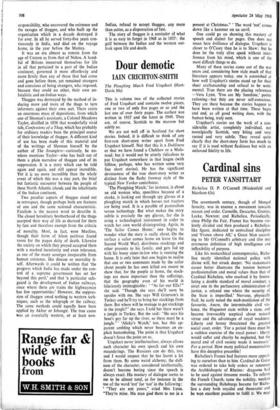Dour demotic
IAIN CRICHTON-SMITH
This is volume two of the collected stories of Fred Urquhart and contains twelve pieces, one or two of only five pages or so and the last one of over forty pages. The earliest was written in 1937 and the latest in 1949. They are, of course, Scottish to the marrow but subtly so. We are not well off in Scotland for short stories. Indeed, it is difficult to think of any first-rate short-story writer apart from Fred Urquhart himself. Not that this is a Dubliners or that we have found a Chekhov or a Mala- mud; but it would not be utterly ridiculous to put Urquhart somewhere in that league (with Sillitoe, perhaps, who has written some very fine short stories). He has the significant deviousness of the true short-story writer as distinot from the flashy freeway style of the typical New Yorker contributor. `The Ploughing Match,' for instance, is about an old woman who, speechless because of a stroke, is looking out through spy glasses at a ploughing match in which horses not tractors are being used. It is a parable of pastoralism versus technology. But what makes the story subtle is precisely the spy glasses, for she is using a technological instrument in order to watch her own world disintegrating. Again, in `The Sailor Comes Home,' one begins to wonder what the story is really about. On the surface a sailor comes home on leave (in the Second World War), distributes stockings and other presents to his family, and gets fed up with his bossy sister-in-law who is running the house. It is only later that one begins to realise that one or two comments made by the sailor about people he has seen killed are meant to show that, for the people at home, the stock- ings are more important than the sufferings, that the geography even of his world is hilariously unimaginable : ` "As for our Ella!" she said. "Though she says she'll soon be upsides with me. She says Will Grierson's in Turkey and he'll try to bring her stockings from there. But where will he manage to get stockings in the jungle?" she says. I told her there wasn't a jungle in Turkey. But she said : "He says his boat's gey far up the river, so there must be a jungle." "Alicky's Watch,' too, has this ap- parent ambling which never becomes an ex- plicit buttonholing. The point is that Urquhart doesn't force the point on us.
Urquhart never intellectualises, always allows each character his own speech and his own meanderings. The Russians can do this, too, and I would suspeot that he has learnt a lot from them. By some weird alchemy, the dull- ness of the character, considered intellectually, doesn't become boring since the speech is always exalt. His mastery of dialogue seems to me to be almost total, as for instance in the use of the word 'nut' for 'not' in the following : "'They are nut yours," cried Mrs Lunn. "They're mine. Ma man gied them to me in a present at Christmas." ' The word `nut'. comes down like a hammer on an anvil.
One could go on showing this mastery of speech and dialect for pages. One does not mean here brilliance of dialogue. Urquhart is closer to O'Casey than he is to Shaw : but he does let the truly alive speak without inter- • ference from his mind, which is one of the most difficult things to do.
Many of these stories come out of the war years and, considering how stale much of that literature appears today, one is astonished at how well Urquhart's stories stand up for their sheer craftsmanship and refusal to be senti- mental. True there are the placing references —Vera Lynn, 'You are My Sunshine,' points rationing—but thdy are never self-conscious. They are there because the stories happen to have been written at that time. These begin and end, as all good writing does, with the human being, truly seen.
Urquhart's stories are the work of a con- siderable artist, completely individual, not nostalgically Scottish, very biting and very rooted and very subtle. They reveal quite clearly that the short-story form has much to say if it is used without flashiness but with an unforced fidelity to life.






































 Previous page
Previous page